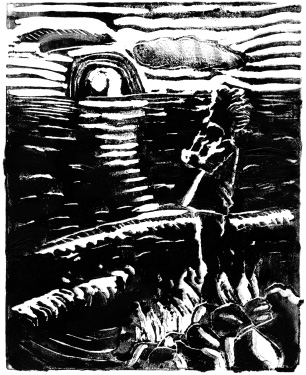
What did it accomplish? Was it worth it? How did it happen? How could we have stopped it? Did so many have to die?
Aren’t there many questions to be asked after a war? Isn’t the big one: “What do we do now?”? Or “How do we make this worth it?”? Or the one the average soldier always asks, as one did in Norman Mailer’s 1948 World War II novel The Naked and the Dead, “Shall the GIs have died in vain?”? How is it possible that this question can be asked after every war and yet never be answered? Is it because if it were answered it would mean the end of war? Or do soldiers keep answering it, but no one wants to hear their answer? Is that why no one wants to hear from rank and file soldiers—why they are available for parades but not for interviews?
“Will tomorrow be different?”
Wouldn’t you expect a lot of questions to have been asked after World War II? When a book called Treasury for the Free World was put together in 1946 with contributions from leaders and writers around the world—nothing from regular soldiers, of course—with an introduction by Ernest Hemingway, wouldn’t you have thought that this would be a book full of questions?
So what did Charles de Gaulle ask about the new world to be built? “How can one imagine it without France?” But when the aptly named de Gaulle talked about France, wasn’t he usually talking about himself?
When, in the same book, the poet Carl Sandburg recalled the words of Lincoln, “We must disenthrall ourselves,” didn’t he say it’s a noble sentiment but what does it mean?
And what is a thrall? And who are thralls?
But at that moment at the end of World War II, would it be surprising that the best questions came from a German, Thomas Mann? Wasn’t he always a great questioner? Didn’t he ask in the foreword to his seven-hundred-page novel, The Magic Mountain, set in a tuber culosis rest clinic where absolutely nothing happens: “When was a story short on diversion or long on boredom simply because of the time and space required in the telling?”? And didn’t he begin his equally long novel, Buddenbrooks, with the question: “What does this mean?”? And isn’t that the essential question?
Could it be that Mann asked the most fundamental question of 1946: “How will it be to belong to a nation, to work in a spiritual tradition of a nation… under whose desperate, megalomaniac effort to become a nation the world has had to suffer so much!”? Why, though, did he end that question with an exclamation mark? Now, more than sixty years later—after Vietnam, Bosnia, Rwanda, Iraq, and Afghanistan—is that question as relevant as Sandburg’s question for 1946?
Have I, have you, been too silent?
Is there an easy crime of silence?